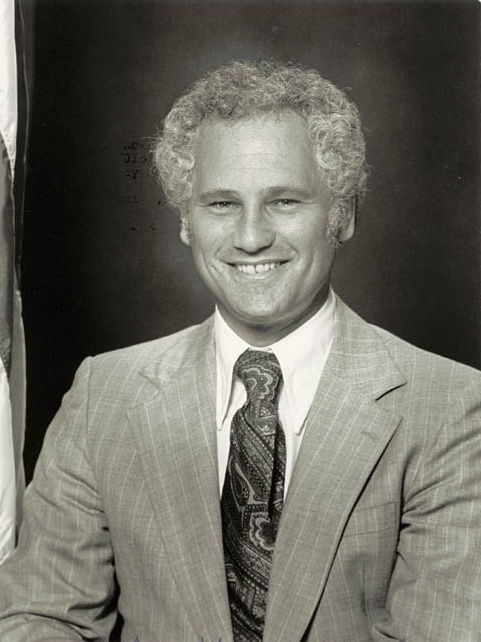Neil Goldschmidt
| Neil Goldschmidt | |
|---|---|

Goldschmidt in 1980, as Secretary of Transportation
|
|
| 33rd Governor of Oregon | |
|
In office January 12, 1987 – January 14, 1991 |
|
| Preceded by | Victor G. Atiyeh |
| Succeeded by | Barbara Roberts |
| 6th United States Secretary of Transportation | |
|
In office September 24, 1979 – January 20, 1981 |
|
| President | Jimmy Carter |
| Preceded by | Brock Adams |
| Succeeded by | Andrew L. Lewis, Jr. |
| 45th Mayor of Portland, Oregon | |
|
In office January 2, 1973 – August 15, 1979 |
|
| Preceded by | Terry Schrunk |
| Succeeded by | Connie McCready |
| Personal details | |
| Born |
Neil Edward Goldschmidt June 16, 1940 Eugene, Oregon |
| Political party | Democratic |
| Spouse(s) |
Margaret Wood (m. 1965–90); divorced Diana Snowden (m. 1994) |
| Children | Joshua Rebecca |
| Residence | Portland, Oregon; also France |
| Alma mater |
University of Oregon UC Berkeley School of Law |
| Profession | Lawyer, businessman, politician |
| Religion | Judaism |
Neil Edward Goldschmidt (born June 16, 1940) is an American businessman and Democratic politician from the state of Oregon who held local, state and federal offices over three decades. After serving as the governor of Oregon, Goldschmidt was once considered the most influential figure in the state's politics. His legacy and career were severely damaged by revelations that he had a sexual relationship with a young teenage girl during his first term as mayor of Portland.
Goldschmidt was elected to the Portland City Council in 1970 and then as mayor of Portland in 1972, becoming the youngest mayor of any major American city. He promoted the revitalization of Downtown Portland and was influential on Portland-area transportation policy, particularly with the abandonment of the Mount Hood Freeway and the establishment of the MAX Light Rail. He was appointed U.S. Secretary of Transportation by President Jimmy Carter in 1979; in that capacity he worked to revive the ailing automobile industry and to deregulate several industries. He served until the end of Carter's presidency in 1981 and then served as a senior executive with Nike for several years.
He was elected the 33rd governor of Oregon in 1986, serving a single term. He faced significant challenges, particularly a rising anti-tax movement (leading to Measure 5 in 1990) and a doubling of the state's prison population. He worked across party lines to reduce regulation and to repair the state's infrastructure. During his term, Oregon emerged from nearly eight years of recession. His reforms to the State Accident Insurance Fund (SAIF), a state-chartered worker's compensation insurance company were heralded at the time, but drew strong criticism in later years.
...
Wikipedia
